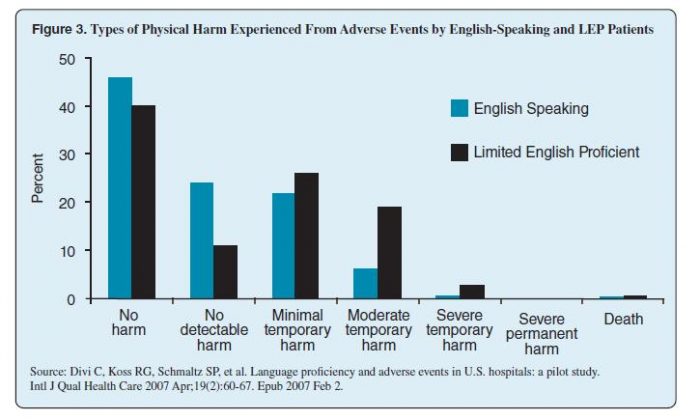Attitudes are shifting in regard to the need for providing translation and interpreter services for healthcare and medical institutions. Studies conducted show that LEP individuals run the risk of more physical harm from adverse events than English speaking patients – highlighting that the need for major changes is now…
Learning from the Past
In the United States, there has been a serious effort aimed at improving patient care. This is particularly true with regards to patient populations whose understanding of English is less than adequate (otherwise known as individuals with Limited English Proficiency or LEP). The total number of LEP individuals in the United States has grown by 81% since 1990, with large numbers residing in California, Texas, and New York. Along with it has grown the need for more interpreter services for healthcare practices and patients.
The growing number of trained medical interpreters, both on site as well as telephonic, currently available in hospitals, clinics, and pharmacies have played a major role in reducing the number of medical errors.
However, according to reports from recent studies, there continue to be medical errors associated with poor communication, especially in dealing with LEP patient populations.
What Needs to Change in Interpreter Services for Healthcare?
Reported in the June 2014 issue of Science Daily, a study aimed at defining the main causes of medical errors found that the three most common causes were directly attributable to insufficient patient language proficiency. It also found that medical errors are most likely to occur during emergency room visits, when acquiring a patient’s informed consent, or when discharging patients.
Despite there being a greater awareness about the need for interpreter services in hospitals and for healthcare settings, many healthcare centers continue to make the same mistakes including:
- Using family members, friends, or unqualified staff as interpreters.
- Allowing clinicians with rudimentary foreign language skills to communicate with patients without an interpreter present.
- Allowing cultural beliefs or traditions to interfere with medical care.

LEP patients are more likely to experience some form of harm than English speaking patients according to a study of language proficiency and adverse events in U.S. hospitals.
Perhaps the biggest issues lie with not understanding the difference between bilingual individuals, and professional interpreters.
Professional interpreters not only have a background in healthcare, but also fluency in both languages: the native language of the patient and that of the treating physician. The difference between fluency and a basic understanding of a language is quite large, as is the difference between a professional and an untrained interpreter. Moreover, a professional medical interpreter is aware of how to address cultural factors that can affect or interfere with treatment.
Failure to provide interpreter services for healthcare practices and LEP patients can lead to much more harm than good.
What Are The Recommendations for Interpreter Services for Healthcare?
In order to prevent these types of medical errors, the following items were recommended by investigators in the Science Daily study:
- Strengthening interpreter services for healthcare.
- Improving coordination of clinical services.
- Providing translated patient education materials.
- Improving training for healthcare staff specifically with regards to communication.
- Using professional medical interpreters.
- Implementing cultural awareness and advocacy.
As a language service provider, many of these recommendations are at the core of what we do. As such, we have a few tips on how best to approach the implementation of translation and interpreter services for healthcare patients.
Strengthening Interpreter Services for Healthcare & Using Professional Interpreters

There are various options available for professional medical interpreters, including on-site support, telephonic support, and video remote interpreting. While telephonic is a popular solution due to the ease of implementation, some medical professionals believe that it creates confusion for patients, and that on-site interpreters are preferred.
Another way for you to strengthen your interpreting services is by investing in interpreter training for multilingual staff. As they will already have the medical background needed, your staff will be introduced to the ethics and best practices of interpreting – which can make all the difference when it comes to accurately interpreting between patient’s and doctors.
Providing Translated Patient Education Materials for Better Interpreter Services for Healthcare
Interpreter services for healthcare and medical practices are beneficial when it comes to verbal interactions between doctors, nurses, staff, and patients. However, when it comes to take home materials, medical interpreters will not be there to assist.
Therefore, it is beneficial to invest in the translation of medical documents. The best way to do this is by identifying which demographics of your patients generally need any written collateral or information that you provide in English, and get it translated into the most commonly spoken languages of those patients. This goes beyond patient education materials to any materials that you regularly offer to LEP patients in English, including website resources and forms.
When looking in to translation for these materials, it is important to keep in mind that word for word translations will generally be unacceptable, as certain terms, concepts, and descriptions (including pictures) may not exist or be considered correct in different languages and cultures.
Be sure to consult with your LSP about these linguistic and cultural nuances to ensure that you get a fully accurate translation.
If you are unable to spare the resources for translation of materials, you can always read aloud any necessary information to the patient in English, and have a professional interpreter orally convey it in the patient’s language (as it is not always acceptable for medical interpreters to perform spot translations of documents).
Improving Training for Healthcare Staff & Implementing Cultural Awareness and Advocacy

Another area where continued education comes into play, is with expanding your staff’s cultural knowledge. Views on medicine are different all over, and educating your employees, nurses, and doctors on these differences can help them to be more accepting, open, and able to communicate with patients (for more information about this, see our blog on tips to successful patient recruitment, as many of the cultural barriers experienced in clinical trials are also experienced by healthcare and medical service providers).
Making efforts to provide more access to professional language services will benefit both your staff and your patients – and as the LEP population will continue needing healthcare services, the results of these efforts will pay off long term.
About Language Connections:
Language Connections is a language service provider. We specialize in technical, medical and legal translation, simultaneous and consecutive interpreting, website and software localization, and corporate language programs and interpreter training. We provide certified, professional translation in 100+ languages including Spanish, Portuguese, Arabic, Chinese, Russian, German, and French. With over 20 years of experience, we have expertise in all major industries including the life sciences, patent and immigration law, international business, global education, and advanced technology. We offer cost-efficient interpreting and conference solutions that will meet your multilingual needs for all types of international events – business meetings, conferences, lectures or presentations.
Get A Free Quote On Your Project Today!
Language Connections Inc.
2001 Beacon Street, Suite 105,
Boston, MA 02135
Phone: +1-617-731-3510
Email: service@languageconnections.com


